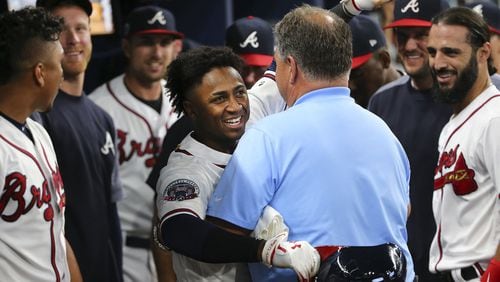It was a memorable week at SunTrust Park. The Braves hosted their alumni over the weekend, from Phil Niekro to John Smoltz to Bobby Cox. But it was the three new faces who grabbed the headlines.
Enter infielder Ozzie Albies and pitchers Lucas Sims and Max Fried. All heralded prospects, each realized a lifelong dream by reaching the majors last week. There are another two or three waves on the way, but the Braves believe the trio of trailblazers is paving the road for what they hope is a sustainable contender.
“There’s a lot of excitement,” Brave manager Brian Snitker said. “You credit a lot of scouts, player development, front office, guys identifying people. That’s all I’m hearing is that there’s a lot of players down there. And I’ve talked to scouts who’ve had our organization and they’re very, very complimentary of what they’re seeing.”
At 51-59, the Braves may be improved over recent years but again have done nothing to warrant postseason whispers. But the season’s last two months may become the most intriguing as more rookies start to arrive.
There are criticisms that the Braves may have been over-aggressively vaulting their prospects through the system. Pitchers Matt Wisler and Aaron Blair, once well-regarded, failed to develop after their debuts. Shortstop Dansby Swanson was promoted from Double-A Mississippi to Atlanta last year, had brief success and then was demoted last month to Triple-A after hitting .213 with 15 errors.
"We rushed some pitchers up here who weren't ready and, candidly, some who were just not good," Braves general manager John Coppolella told the AJC in April. "We didn't have anywhere else to go."
Fried, called up from Mississippi on Saturday, hopes to avoid a similar fate as Swanson. He’ll operate from the bullpen, which Snitker sees as an ideal means to break him in. Albies and Sims had done all they could in Triple-A Gwinnett before their call-ups. They’ve had good and bad results in a small sample size, but the Braves’ sub-.500 circumstances will allow them consistent playing time.
“It depends on the situation,” Snitker said. “When we brought (Brian) McCann, (Jeff) Francoeur, that group up, they played, but they weren’t just every-day guys. They still kind of worked their way in, earned their playing time. That whole group I had in ’05 in Double-A, they were skipping Triple-A. They were all very talented players who came up here and contributed.”
Ronald Acuna, a 19-year-old outfielder extraordinaire, is hitting .341 against Triple-A pitching, having increased his average at every level of the minors. It’s likely he soon supplants Albies (20) as the youngest player in the majors, be it this September or Opening Day 2018.
Coppolella has made it clear: Players who improve will be rewarded and, as illustrated by Albies bumping 36-year-old veteran Brandon Phillips to third base, the team will make room for them when they’re ready.
Snitker doesn’t view the Braves’ strategy as unique. It’s the sport’s new trend.
“It’s industry wide,” Snitker said. “There’s very few guys who come to the big leagues ‘ready.’ You see a league full of guys like that. They’re rushed through the minor leagues more than they were. But again, what I’m seeing is, a guy with skills can survive here. But it’s everybody. It’s a whole industry full of players like that.
“So that’s why sometimes some guys come up and they go back for another taste (of the minors). There’s nothing wrong with that. To get up here and experience the speed of this game, what it’s all about, a guy comes back and they’re usually more prepared.”
Snitker, a 19-year-plus minor league manager, welcomes more fresh blood in the clubhouse. He’s more than aware that Coppolella’s philosophy echoes through all minor league levels. If prospects perform, their clock will be accelerated.
“When they see young guys getting an opportunity, it does energize those guys,” Snitker said. “‘You know, I’m not that far away. The harder I work, all of a sudden, this becomes a reality.’ I used to tell guys, ‘You’re a lot closer than what you think. You might think you’re a long way away, but you’re a lot closer than what you think.’ When these guys see their teammates, friends get that opportunity, it does nothing but energize them a little bit.”







